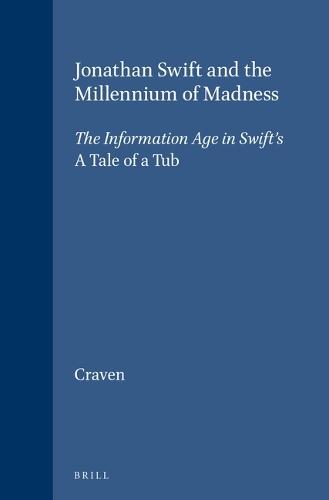Overview
Casting aside critical shibboleths in place for centuries, Kenneth Craven's Jonathan Swift and the Millennium of Madness proposes a new view of intellectual history. This revisionary study documents Swift's intimate knowledge of seventeenth-century science from Bacon and the Invisible College at Oxford to the Newtonian synthesis within the context of Paracelsian medicine and the chemical-mechanical split. Craven shows that Swift joins the philosophies of a neoplatonic divine order, Epicurean atomism, the Reformation, and scientific millenarianism as permeating his time with millennial myths sure eventually to detonate the sense of composure of individuals and societies. In contradistinction, Swift elucidates links between the humors traditions in medicine and literature, saturnine melancholy and the dreaming god Kronos. He proposes the somber realism of the Kronos myth as providing awareness of the self-imposed restraints on ego needed to preclude the proliferation of modern information systems into trivialization of the human enterprise to meaninglessness. This fresh and exhaustive examination of the Anglo-Irish writer's first masterpiece, A Tale of a Tub (1704) unlocks barriers to seeing the nature of Swift's complex integrity, passion, and literary achievements throughout a career studded with disappointments. Specifically, this study authoritatively reveals the identity of unnamed victims of Swift's satire as the deist John Toland and his republican hero, John Milton, for their advocacy of the Puritan Revolution and regicide; Toland's mentor John Locke and another Lockean disciple, Lord Shaftesbury, who confused happiness and self-interest with delusion and the public weal; and his tormentors in the Church of Ireland, Narcissus Marsh and Peter Browne.
Full Product Details
Author: Kenneth Craven
Publisher: Brill
Imprint: Brill
Volume: 30
Weight: 0.001kg
ISBN: 9789004095243
ISBN 10: 9004095241
Pages: 240
Publication Date: 01 February 1992
Audience:
College/higher education
,
Professional and scholarly
,
Postgraduate, Research & Scholarly
,
Professional & Vocational
Format: Hardback
Publisher's Status: Active
Availability: Available To Order

We have confirmation that this item is in stock with the supplier. It will be ordered in for you and dispatched immediately.
Reviews
'Craven's portrayal of the conflux of issues in literature, science, and political thought of the Augustan Age brilliantly exposes a condition that is likely to be continuously investigated during the remainder of the present century, that modern information systems remain skewed by a deconstructing millenarian myth. ' A. Owen Aldridge, Modern Age, 1995. '...an exciting, idiosyncratic book...' John Sutton, Metasciena, 1994. 'This energetic and stimulating book should prove of considerable significance in the development of a proper understanding of the Irish intellectual background to Swift's early work.' Andrew Carpenter, Eighteenth-Century Ireland, 1994. '...on trouvera beaucoup d'idees stimulantes et eclairantes dans ce livre tres interessant qui jette une lumiere nouvelle sur plusieurs ecrits de S.' A. Thomson, Dix-huitieme siecle, 1995.
Author Information
Kenneth Craven, Ph.D. in comparative literature (English and Russian), Columbia University, has served on the faculty of the City College of New York, practiced psychotherapy, and worked as management consultant for A.T. & T., IBM, and the Xerox Corporation. His landmark study for the National Science Foundation and the Modern Language Association defined the information cycle and prescribed the first doctoral programs in information and computer sciences.



